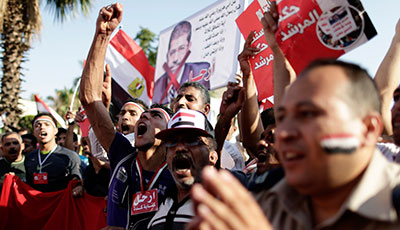New York, June 28, 2013–Egypt’s Ministry of Investment sent notice today to all satellite television channels warning they will be shut down if the government deems that their coverage of this weekend’s political protests incites violence, insults individuals, or contradicts societal values, news reports said. Numerous journalists are also facing new legal threats in the two days since President Mohamed Morsi blasted independent media in his national address, according to Egyptian news reports, which also described the abduction of an editor.
“The government warning to satellite channels is yet another attempt in an ongoing campaign by the administration to intimidate independent and private media into self-censorship,” CPJ Deputy Director Robert Mahoney said. “In a democracy the president is a public figure and as such is subject to a higher threshold of criticism and satire than an ordinary citizen. President Mohamed Morsi cannot use outdated insult laws to shield his administration from critical reporting and commentary. His government must end threats of prosecution of journalists and economic sanctions against news outlets immediately.”
Several people were reported killed in protest-related violence today. They included an American who was reported stabbed while taking photographs in Alexandria, according to an English-language report by state-run Al-Ahram.
The Ministry of Investment, which licenses private broadcasters, already acted this week to shut down the harshly critical private station Al-Faraeen TV. On Thursday, the ministry dismissed representatives of the three television stations–CBC, Dream, and Al-Nahar–from the board of the Media Free Zone, a state-run body that provides tax incentives, production facilities, and satellite access to media companies. The stations fear the move threatens their future participation in the zone, which is essential to their viability. All three channels have carried critical coverage on the Morsi administration.
In his speech on Wednesday, Morsi accused CBC owner Mohamed al-Amin and Dream owner Ahmed Bahgat of promoting coverage critical of the government as a way to cover up supposed financial and legal problems. Al-Amin later said the general prosecutor had imposed travel restrictions that barred him from leaving the country, news reports said.
The public prosecutor’s office said Thursday it would re-open investigations into a number of journalists accused of insulting Morsi. The office issued an arrest warrant for Tawfiq Okasha, owner and presenter on Al-Faraeen TV, whose station was subject of the investment ministry’s shutdown order, reports said. Okasha, who has vociferously criticized the administration, is under investigation for allegedly insulting the president and calling for a military coup against him.
Welad El-Balad reported on Wednesday that it had received an SMS message saying that one of its editors, Mohamed Hayaza, had been taken captive in the city of Mansoura while covering clashes between supporters and opponents of Morsi. The journalist was found Thursday night with his body showing evidence of torture, news reports said. Hayaza said the captors wanted information about his newspaper, which is known for its criticism of the Muslim Brotherhood.
Meanwhile, Gamal al-Shaer, talk show host for Egyptian TV 2, resigned on the air in protest of what he called the Muslim Brotherhood’s attempts to control his program through the Ministry of Information.
In a nationally broadcast speech that stretched for nearly three hours on Wednesday, Morsi accused the private media of tarnishing the image of the presidency, inciting violence, and receiving funds from loyalists of the former Mubarak regime. Morsi also warned the opposition and media that, as the military’s commander in chief, he would refer anyone who insults him to military trials.
“One year is enough!” Morsi said, referring to criticism of his administration.
Recurring protests in Egypt since the revolution have proven especially dangerous for journalists, facing physical attacks from security forces and hostile demonstrators alike.
- For more data and analysis, visit CPJ’s Egypt page.
